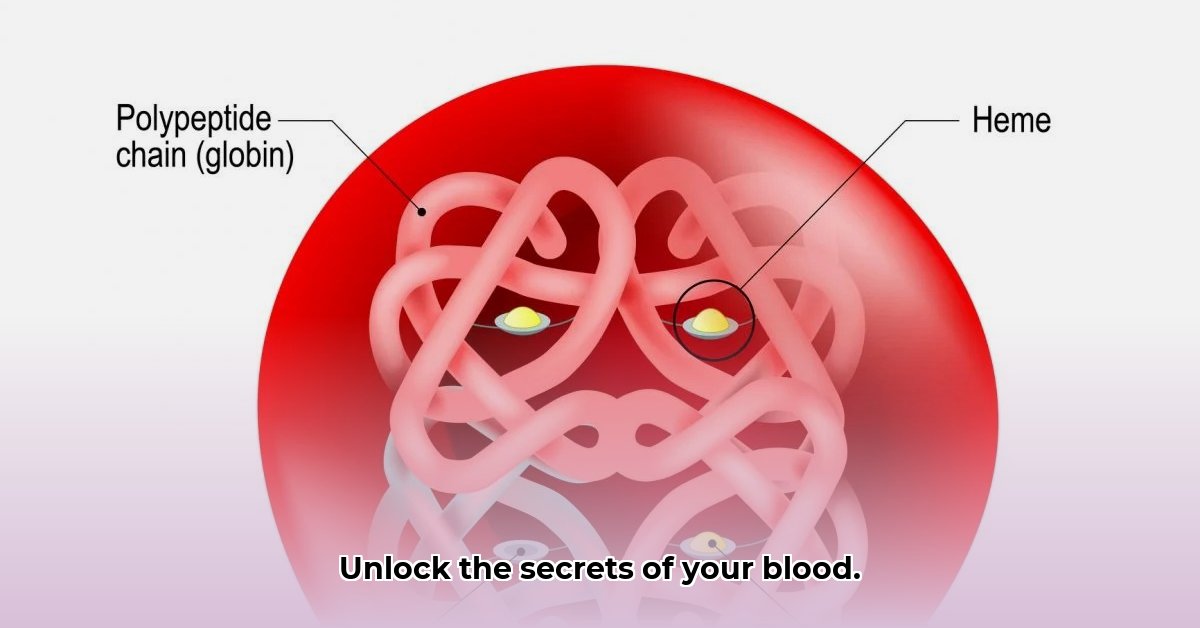
Haemoglobin: Your Body's Oxygen Transporter
Haemoglobin (Hb), a protein found in red blood cells, is essential for carrying oxygen from your lungs to the rest of your body. Think of it as a tiny taxi service, constantly delivering oxygen where it's needed. Maintaining healthy Hb levels is crucial for overall wellbeing. But what happens when these "taxis" aren't functioning optimally? Let's explore the intricacies of Hb and its role in your health. Understanding your Hb levels is a key part of preventative healthcare.
What's a Normal Haemoglobin Level?
Normal Hb levels aren't fixed; they vary depending on factors like age, gender, and overall health. A simple blood test, a Complete Blood Count (CBC), measures your Hb levels (in grams per decilitre or g/dL). Your doctor will interpret the results within the context of your individual health profile. Significantly high or low levels often indicate underlying health issues requiring further investigation. Is there a specific Hb level that concerns you? Discussing this with your doctor will provide clarity.
Low Haemoglobin: Anaemia Explained
Low Hb levels, or anaemia, signify an insufficient number of healthy red blood cells or a deficiency in Hb itself. This means your "oxygen taxis" are struggling to meet the body's demand. Consequently, you might experience fatigue, weakness, and shortness of breath. We'll break down common causes of anaemia.
- Iron deficiency: Iron is crucial for Hb production. An iron-deficient diet can lead to reduced Hb synthesis (i.e., the body produces fewer Hb molecules).
- Vitamin deficiencies: Vitamins B12 and folate are crucial for red blood cell production and Hb formation. Deficiencies in these vitamins directly impact Hb levels.
- Blood loss: Significant blood loss, whether from injury, internal bleeding, or heavy menstruation, reduces Hb levels.
- Bone marrow problems: Bone marrow dysfunction interferes with red blood cell production, diminishing Hb levels.
- Chronic illnesses: Certain chronic diseases, such as kidney disease or cancer, can disrupt Hb production. How does your body normally produce haemoglobin? Understanding this process helps us understand what can go wrong.
Diagnosing anaemia requires pinpointing the underlying cause. Your doctor might order additional blood tests, imaging scans, or specialist consultations to determine the root problem. Treatment focuses on managing the underlying issue. This might include dietary changes, supplements, medication, or addressing a pre-existing medical condition. Remember, a comprehensive approach is vital for effective treatment.
High Haemoglobin: Polycythemia
Conversely, high Hb levels, known as polycythemia, indicate an excess of red blood cells — more "oxygen taxis" than your body needs. This can thicken the blood, increasing your risk of blood clots. The underlying causes are typically:
- Primary polycythemia: This is a bone marrow disorder characterized by excessive red blood cell production.
- Secondary polycythemia: Often associated with chronic lung disease or high-altitude living, it's a compensatory response to low oxygen levels.
High Hb levels necessitate a thorough medical evaluation to identify and address the underlying problem. Treatments may involve medication to regulate red blood cell production or procedures to reduce the number of red blood cells. Why is early diagnosis of polycythemia crucial? Because early intervention can prevent serious complications.
Interpreting Your Haemoglobin Results
Understanding your Hb levels requires professional medical interpretation. While general ranges exist, your doctor considers your overall health, symptoms, and other test results to accurately diagnose and create a personalized treatment plan. Don't hesitate to ask your doctor any questions. It's your health, and understanding it is essential. What are some questions you should be asking your doctor? Ask about any blood test results you may have concerns about.
Maintaining Healthy Haemoglobin Levels
A healthy lifestyle significantly contributes to healthy Hb levels. This includes:
- Balanced diet: A diet rich in iron, vitamin B12, and folate is crucial for Hb production. Iron-rich foods include red meat, spinach, beans, and lentils. B12 is found in meat, poultry, fish, and dairy products. Folate is present in leafy greens, legumes, and citrus fruits.
- Regular exercise: Regular physical activity supports overall health and contributes to efficient blood flow and oxygen delivery.
- Hydration: Maintaining adequate hydration ensures proper blood volume and circulation.
- Adequate sleep: Sufficient sleep allows your body to repair and regenerate, including red blood cells.
- Regular check-ups: Regular blood tests help detect any abnormalities early, allowing for prompt intervention.
Collaborative Healthcare: A Holistic Approach
Effective management of Hb levels requires a collaborative effort:
| Stakeholder | Actions |
|---|---|
| Patient (low Hb) | Consult a doctor, adjust diet, address underlying health concerns. |
| Patient (high Hb) | Consult a doctor, monitor for symptoms, adhere to treatment plans. |
| Healthcare Provider | Comprehensive assessment, thorough diagnosis, personalized treatment plans. |
Haemoglobin is a vital component of your body's oxygen transport system. Understanding its role and prioritizing your Hb levels are critical for your overall health and wellbeing. Remember, regular consultations with your doctor are essential for maintaining optimal health.